The cavalcade of solid catalog titles premiering on 4K UHD continues this month with a welcome Dolby Vision presentation of DRAGONSLAYER (109 mins., 1981, PG; Paramount), an expensive 1981 collaboration between Paramount Pictures and the Walt Disney Studio that was a flop in its day. Time, fortunately, has been kind to director Matthew Robbins’ film, which receives significant enhancements here over its previous DVD and HD master, which has been available only on streaming for many years.
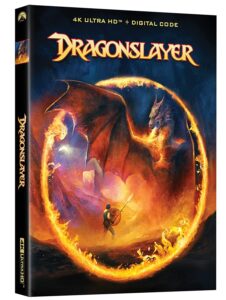 In Robbins and writing partner Hal Barwood’s original script, a dragon terrorizes the countryside, forcing the sacrifice of young virgins to satisfy the monster’s appetite. To try and save the day comes wizard Ralph Richardson, whose befuddled apprentice (Peter MacNicol) finds himself in over his head once he’s put in charge of slaying the beast.
In Robbins and writing partner Hal Barwood’s original script, a dragon terrorizes the countryside, forcing the sacrifice of young virgins to satisfy the monster’s appetite. To try and save the day comes wizard Ralph Richardson, whose befuddled apprentice (Peter MacNicol) finds himself in over his head once he’s put in charge of slaying the beast.
A spectacular climax with ILM special effects is the film’s main draw, but despite the film’s abundant visual pleasures, it’s easy to see why “Dragonslayer” failed to find an audience in its initial release: the movie is overly serious and too dark (literally) for kids, while suffering some problems in the casting of its central leads. The filmmakers crafted a totally believable world for its characters and dragons to exist in, but consensus was that the miscasting of Caitlin Clarke (who’s actually much better here than I recall) and particularly MacNicol (he claimed to have left the movie off his resume for years), combined with its lack of humor, made it a tough sell with audiences.
That being said, the picture’s story and developed surroundings make “Dragonslayer” a worthwhile fantasy to revisit, especially now that Paramount has remastered the film for 4K UHD (2.35) in a Dolby Vision HDR enhanced transfer that brings more contrast and shading to what was and still is a gloomy looking picture. The ILM special effects were top-notch for their day, and the execution/design of the dragons and their flight sequences are still unsurpassed. The sense of local communities dealing with the horror give the movie a strong sense of a “real” time and place, and the film is also graced by a dense and darkly magnificent Alex North score, which ranks as one of his best – even if one could argue its unrelenting “heaviness” is more effective in backing the movie’s atmosphere than its characters (had the picture been made a short time later, it’s entirely possible North’s work may have been replaced with something more upbeat or “heroic” in nature).
North’s score and the movie’s sound design both come off well in the movie’s Dolby Atmos soundtrack (also 7.1 compatible) while the Dolby Vision HDR provides a wider dynamic range, desperately needed in scenes which appeared drab in previous home video transfers – a spell cast by Richardson’s sorcerer into a cauldron carries more of a glow, flickering torches brighten dark caverns – which all add up to a superb visual package, showing more than standard-def transfers ever could have.
“Dragonslayer” never made it to Blu-Ray but the prolonged wait for the film to at last receive its due in HD will be worth it for fans. Paramount has produced several new extras to sweeten an already superb a/v package, highlighted by “The Slayer of All Dragons,” which brings you back to the days when catalog discs routinely would receive retrospective documentaries. This hour-long look back interviews Robbins, Phil Tippett and Dennis Muren among others for an examination of the production, with Robbins praising Alex North’s score and discussing how the film was quickly written off as a failure in the immediate wake of “Raiders of the Lost Ark.”
Screen tests of MacNicol and Clarke, the trailer, and a commentary between Robbins and fan Guillermo Del Toro put the finishing touch on what’s already one of the best catalog UHD’s of 2023. Highly recommended! (Note a separate Blu-Ray release is also out from Paramount).
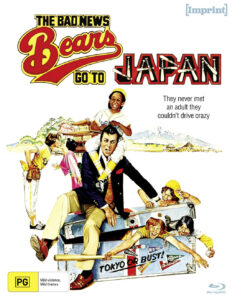 Imprint New Releases
Imprint New Releases
When “The Bad News Bears” became a box-office smash in 1976, sequels went into near-immediate production, the first of which – “The Bad News Bears in Breaking Training” – lacked the involvement of both director Michael Ritchie and writer Bill Lancaster. Both sat in the stands, as it were, while the 1977 follow-up became a sequel that met with general fan approval, enough to spur the production of another picture that did lure both Ritchie (as a producer) and Lancaster back to the franchise.
The net result was THE BAD NEWS BEARS GO TO JAPAN (92 mins., 1978, PG; Imprint Editions), one of those head-scratching “what were they thinking?” misfires that’s more interested in the misadventures of long-in-the-tooth star Tony Curtis than the rag-tag little leaguers who here venture to the Far East to take on their Japanese counterparts.
It’s a surprising(ly bad) sequel because Ritchie and Lancaster were directly involved, the movie being inferior to not only the original classic but even the ‘77 sequel that – while itself an obvious comedown from its predecessor – still functions as a fun “kids road trip” flick from the era, complete with a good performance from William Devane as Kelly Leak’s (Jackie Earle Haley) estranged father.
There are no such pleasures to be mined in Part 3, which unwisely takes the focus off the team (several of the kids including Chris Barnes’ Tanner Boyle smartly avoided this one) and shifts it to struggling huckster-promoter Curtis, who latches onto the Bears and their trip to Japan to play the overseas little league champion (hinted at by a couple of planted dialogue lines in the second film).
Lancaster’s script is built around the utilization of Japanese culture and while the location shooting gives the film some appeal – its only appeal – the fragmented story is hard to decipher in terms of what it was trying to achieve. The sequences involving the Bears themselves feel completely arbitrary, with Haley reduced to being involved in an asinine puppy-love romance with a local girl, while Curtis’ character drives the entire picture. Alas, his comedic exploits simply aren’t funny, and the lack of interplay between him and the kids – save the cute younger brother of “Ahmad Abdul Rahim” – makes for a dismal picture in line with some of producer Ritchie’s worst films. And you know a movie is in big trouble when cameos by Regis Philbin and figure skating gold medalist (and TV commentator) Dick Button are the picture’s strongest suit!
Fans of the series may still want to check out Imprint’s limited-edition Blu-Ray of the third “Bad News Bears” movie, seeing as Imprint also released “Breaking Training” last year. The Paramount catalog master (1.85, mono) is clearly of an older vintage but it’s not bad, and a commentary by Scott Harrison tries to sell the film as being superior to the sequel that preceded it (it’s not). The sole extra is an audio conversation with composer Paul Chihara, whose adaptation of “The Mikado” tries to give the picture some comedic inspiration – yet it’s clear even he was aware of how dire the finished product was.
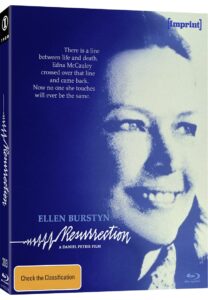 RESURRECTION Blu-Ray (103 mins., 1980, PG; Imprint): In Daniel Petrie’s 1980 movie which earned critical kudos but never caught fire at the box-office, Ellen Burstyn plays a woman who, after an accident that claims the life of her husband, awakens from a near-death experience with the ability to heal. Returning to the Kansas farming community she was raised in, Burstyn’s character tries to make sense of her brush with the afterlife and remarkable power, though has difficulty when she rubs up against fire-and-brimstone religious practitioners like the son (Sam Shepard) of a local preacher and her own Puritanical father (Roberts Blossom), both of whom want her to make a religious declaration of her abilities.
RESURRECTION Blu-Ray (103 mins., 1980, PG; Imprint): In Daniel Petrie’s 1980 movie which earned critical kudos but never caught fire at the box-office, Ellen Burstyn plays a woman who, after an accident that claims the life of her husband, awakens from a near-death experience with the ability to heal. Returning to the Kansas farming community she was raised in, Burstyn’s character tries to make sense of her brush with the afterlife and remarkable power, though has difficulty when she rubs up against fire-and-brimstone religious practitioners like the son (Sam Shepard) of a local preacher and her own Puritanical father (Roberts Blossom), both of whom want her to make a religious declaration of her abilities.
The religious commentary is a little heavy-handed and becomes a central component in writer Lewis John Carlino’s multi-tiered script as the picture progresses. The climax of “Resurrection” is also something of a mess as the movie abruptly tries to arrive at a dramatic resolution with story strands that, these days, would’ve been better served being played out in a longer-form series structure. Yet Burstyn’s appealing performance is unquestionably one of her best, and Carlino’s screenplay works in its overall characterization of her lead role – a woman whose belief in love and compassion brings her to a personal realization of a higher power, and who’s less interested in ordaining herself as a holy person.
“Resurrection”’s Imprint Blu-Ray includes a 1080p (1.85) 2K scan that’s generally respectable though has an occasional encoding artifact here and there. The mono sound is clear and features a quite good Maurice Jarre score that regrettably never was released. Exclusive extras include a superb half-hour interview with Burstyn who rightly regards the film as one of her finest (she also discusses how she essentially developed the concept herself after vetoing a movie that was meant to detail Jesus’ resurrection), video essay by Kat Ellinger, and commentary from Lee Gambin.
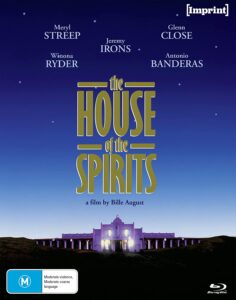 THE HOUSE OF THE SPIRITS Blu-Ray (132/146 mins., 1993, R; Imprint): Isabel Allende’s bestselling novel became an expensively mounted “international co-production” thanks to German producer Bernd Eichinger and Danish writer-director Billie August – who recruited an Anglo, mostly American, cast to fill the roles of a Chilean family during the multiple decades of its military dictatorship. The movie boasts everyone from Meryl Streep and Glenn Close to Winona Ryder, Vanessa Redgrave and Jeremy Irons, all of whom struggle to inhabit this weird adaptation of Allende’s book which is nearly impenetrable to those who never read the source material. Meanwhile, authentic Latino roles are inhabited by the likes of Antonio Banderas and Maria Conchita Alonso, who must’ve been wondering why they didn’t land the bigger parts (hey it was a different time). A big budget bust that debuted in some European territories at 146 minutes but was re-edited/trimmed to 132 minutes by U.S. distributor Miramax, “The House of the Spirits” makes its worldwide Blu-Ray debut from Imprint sporting both versions in HD. The U.S. theatrical release receives the bigger and better transfer (1080p, 2.0 LPCM) with the “international version” derived from a German print encoded at a far lower, more compressed bit-rate, though it’s still certainly watchable. Extras include a commentary with Scott Harrison and interview with First AD Guy Travers.
THE HOUSE OF THE SPIRITS Blu-Ray (132/146 mins., 1993, R; Imprint): Isabel Allende’s bestselling novel became an expensively mounted “international co-production” thanks to German producer Bernd Eichinger and Danish writer-director Billie August – who recruited an Anglo, mostly American, cast to fill the roles of a Chilean family during the multiple decades of its military dictatorship. The movie boasts everyone from Meryl Streep and Glenn Close to Winona Ryder, Vanessa Redgrave and Jeremy Irons, all of whom struggle to inhabit this weird adaptation of Allende’s book which is nearly impenetrable to those who never read the source material. Meanwhile, authentic Latino roles are inhabited by the likes of Antonio Banderas and Maria Conchita Alonso, who must’ve been wondering why they didn’t land the bigger parts (hey it was a different time). A big budget bust that debuted in some European territories at 146 minutes but was re-edited/trimmed to 132 minutes by U.S. distributor Miramax, “The House of the Spirits” makes its worldwide Blu-Ray debut from Imprint sporting both versions in HD. The U.S. theatrical release receives the bigger and better transfer (1080p, 2.0 LPCM) with the “international version” derived from a German print encoded at a far lower, more compressed bit-rate, though it’s still certainly watchable. Extras include a commentary with Scott Harrison and interview with First AD Guy Travers.
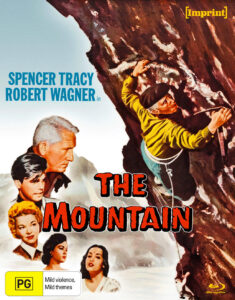 GEORGIA Blu-Ray (118 mins., 1995, R; Imprint): Superb performances from Jennifer Jason Leigh and Mare Winningham sell a script by Barbara Turner – Leigh’s mother – that examines the relationship between siblings Leigh – the rebellious rocker who can’t settle down – and Winningham, playing the family-oriented singer who has. Director Ulu Grosbard receives excellent turns from both leads in an acting showcase for both Leigh and Winningham, who previously appeared in Turner’s terrific TV-movie “Freedom” (available in Fun City Editions’ “Primetime Panic” Blu-Ray box). Imprint’s debut Blu-Ray of “Georgia” – a movie that’s been hard to track down since the early DVD era – includes a 1080p (1.85) transfer, 2.0 PCM stereo track, and extras including an interview with star John Doe; commentary from Bryan Reesman and Max Evry; and archival conversations with Leigh, Winningham, Turner and Doe.
GEORGIA Blu-Ray (118 mins., 1995, R; Imprint): Superb performances from Jennifer Jason Leigh and Mare Winningham sell a script by Barbara Turner – Leigh’s mother – that examines the relationship between siblings Leigh – the rebellious rocker who can’t settle down – and Winningham, playing the family-oriented singer who has. Director Ulu Grosbard receives excellent turns from both leads in an acting showcase for both Leigh and Winningham, who previously appeared in Turner’s terrific TV-movie “Freedom” (available in Fun City Editions’ “Primetime Panic” Blu-Ray box). Imprint’s debut Blu-Ray of “Georgia” – a movie that’s been hard to track down since the early DVD era – includes a 1080p (1.85) transfer, 2.0 PCM stereo track, and extras including an interview with star John Doe; commentary from Bryan Reesman and Max Evry; and archival conversations with Leigh, Winningham, Turner and Doe.
THE MOUNTAIN Blu-Ray (105 mins., 1956; Imprint): Location shooting aids this decent Paramount outdoor adventure, shot in VistaVision, starring Spencer Tracy as a sage mountain guide who decides to guide tumultuous younger brother Robert Wagner up a dangerous slope in order to access the site of a plane crash. Tracy and Wagner are oddly cast here in what’s more of a father/son dynamic than a sibling one, but Edward Dmytryk’s workmanlike film still has its moments and a solid supporting cast including Claire Trevor and a young E.G. Marshall, plus French Alps locales that lend the picture some scenic majesty. A 1080p (1.78, mono) transfer derived from a 2K scan of the original negative greets viewers in Imprint’s Blu-Ray package with new extras including a commentary by writer Howard Berger; interview with Robert Wagner; and 1990 interview with Dymtryk on the “Hollywood Ten.”
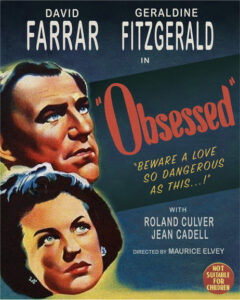 ClassicFlix New Releases
ClassicFlix New Releases
England had its period of “B” movies from the UK industry’s movie-making heyday, as evidenced by the whodunit OBSESSED (78 mins., 1951). Also known as “The Late Edwina Black” (also its UK release title), this mystery from Romulus and British Lion adapted a stage play by William Dinner and William Morum, with David Farrar essaying the surviving husband of a wealthy, unlikeable woman in the Victorian era whose death would’ve ordinarily been just a footnote – had she not been poisoned by arsenic! What’s more, Farrar’s Mr. Black and her companion, Elizabeth (Geraldine Fitzgerald), are lovers who’ve carried on on their affair in their small English village with little secrecy.
Soon on the case is a Scotland Yard inspector (Roland Culver) who hopes to implicate them in a drawing room picture that seems “stagy” and thrifty in its overall filmmaking approach, yet should satisfy genre fans of the era. Certainly no fault can be found with this superb Blu-Ray restoration from ClassicFlix and Studio Canal, which offers a detailed and sparkling 1080p (1.37 B&W) transfer with mono sound.
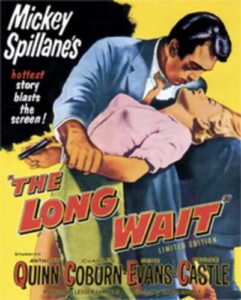 Though writer Mickey Spillane’s attention was mostly turned towards books featuring his detective hero Mike Hammer, he also wrote THE LONG WAIT (94 mins., 1954), which was in turn adapted into a movie from the same independent production team as produced “I, The Jury” the year prior.
Though writer Mickey Spillane’s attention was mostly turned towards books featuring his detective hero Mike Hammer, he also wrote THE LONG WAIT (94 mins., 1954), which was in turn adapted into a movie from the same independent production team as produced “I, The Jury” the year prior.
This is a low-budget programmer that, at least, offers an irresistible film noir plot: a man who’s involved in a terrible accident can’t remember who he is. After receiving a mysterious photograph of himself in a small town, Johnny McBride (Anthony Quinn, on the cusp of his career taking off) heads there searching for answers – but finds out instead that he’s wanted for the murder of the town’s district attorney, not to mention is also (apparently) a thief who stole $250,000 of cash from the bank he worked at. Only his ex-lover (Peggie Castle) presents any hope of finding out the answers in a nasty little place presided over by a mob boss (Gene Evans).
“The Long Wait” has certainly had a long wait in terms of its home video release: this limited-edition 4K UHD/Blu-Ray combo from ClassicFlix offers the 1954 movie’s first-ever official format debut, in a spectacular 4K restoration (1.75 B&W) at that. The movie looks great, and while the dramatics are a bit awkwardly rendered in director Victor Saville’s movie (not unlike “I, The Jury”), if you’re a fan of ‘50s noir potboilers or Spillane (or Quinn for that matter), the picture is worth checking out. Supplements here include a commentary from pulp writer Max Allan Collins and an image gallery, with ClassicFlix’s restoration offered on both a UHD and Blu-Ray in the limited-edition combo set.
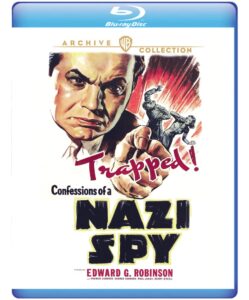 Warner Archive New Releases
Warner Archive New Releases
Several Blu-Ray premieres await movie buffs this month from Warner Archive, all in new HD masters and many with supplemental content. (Note: fans looking for the best deal on these discs should check out the affiliate links below as well as Moviezyng, which frequently runs sales across Archive titles and offers speedy shipping direct from the distributor)
FLAMINGO ROAD Blu-Ray (94 mins., 1949): One of Joan Crawford’s seminal potboilers offers the star as a hardened carnival performer who, after being stranded in a small town, ends up being wedged right into aspiring politician Zachary Scott’s campaign. That doesn’t sit well with his political advisor Sydney Greenstreet, who wants this girl from the wrong side of the circus tent to go away; naturally, things don’t go quite the way he envisioned in this finely-engineered Warner Bros. release from prolific director Michael Curtiz and producer Jerry Wald. Capped with a Max Steiner score, “Flamingo Road” is a must for Crawford fans, with a crisply restored 1080p (1.37) master with extras including the featurette “Crawford at Warners,” “Breakdown of 1949,” classic cartoon “Curtain Razor” and audio-only radio adaptation featuring the stars.
CONFESSIONS OF A NAZI SPY Blu-Ray (104 mins., 1939): A perfectly-pitched piece of Hollywood propaganda produced prior to our country’s involvement in WWII, “Confessions of a Nazi Spy” stars Edward G. Robinson as a tough FBI agent on the trail of a Nazi spy ring operating within the confines of the U.S.A. Francis Lederer, George Sanders and Paul Lukas lay on the vile German villainy in Anatole Litvak’s Warner production, also scored by Max Steiner, which doesn’t pull back from its messaging, especially towards the end. Another strong Blu-Ray debut from the Warner Archive, “Confessions” boasts a fine 1080p (1.37) B&W transfer with the trailer and vintage WB short “Meet the Fleet.”
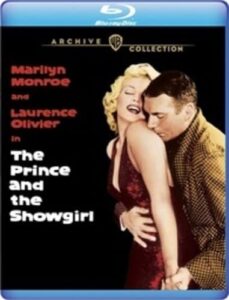 NEPTUNE’S DAUGHTER Blu-Ray (95 mins., 1949): I had no idea perennial yuletide duet “Baby It’s Cold Outside” not only won an Oscar but originated in this 1949 MGM musical, widely regarded as the best of Olympian Esther Williams’ cinematic Hollywood adventures. The bathing beauty plays a swimsuit designer who’s wooed by Ricardo Montalban, rubs up with comic Red Skelton, and swims through a zesty MGM studio affair with the likes of Xavier Cugat and His Orchestra, Keenan Wynn and Mel Blanc supporting the fun along with songs by the great Frank Loesser. Fans should be delighted with Warner Archive’s transfer (1.37), derived from a 4K scan of nitrate Technicolor camera negatives, resulting in a splendid, vibrant image. Ample extras include Betty Garrett’s outtake number “I Want My Money Back,” MGM cartoon “Hatch Up Your Troubles,” the studio short “Water Trix,” radio interviews with Williams, the trailer and more.
NEPTUNE’S DAUGHTER Blu-Ray (95 mins., 1949): I had no idea perennial yuletide duet “Baby It’s Cold Outside” not only won an Oscar but originated in this 1949 MGM musical, widely regarded as the best of Olympian Esther Williams’ cinematic Hollywood adventures. The bathing beauty plays a swimsuit designer who’s wooed by Ricardo Montalban, rubs up with comic Red Skelton, and swims through a zesty MGM studio affair with the likes of Xavier Cugat and His Orchestra, Keenan Wynn and Mel Blanc supporting the fun along with songs by the great Frank Loesser. Fans should be delighted with Warner Archive’s transfer (1.37), derived from a 4K scan of nitrate Technicolor camera negatives, resulting in a splendid, vibrant image. Ample extras include Betty Garrett’s outtake number “I Want My Money Back,” MGM cartoon “Hatch Up Your Troubles,” the studio short “Water Trix,” radio interviews with Williams, the trailer and more.
THE PRINCE AND THE SHOWGIRL Blu-Ray (117 mins., 1957): A quite watchable yet languid Laurence Olivier film which he directed, produced and starred in opposite Marilyn Monroe, who plays a visiting American showgirl that slowly dethaws Olivier’s stuffy Prince Regent of Carpathia. Set during the coronation of George V in 1911, Terence Rattigan’s own adaptation of his play “The Sleeping Prince” bears all the hallmarks of a classy production – led by Jack Cardiff’s color cinematography – though the issues surrounding the reportedly troubled (as documented in the 2011 film “My Week With Marilyn”) film may well have spilled over to the final product, which despite the stars, seems to be “missing something” from a dramatic angle. Warner Archive’s Blu-Ray hails from a 4K restoration (1.85) and includes the trailer as its sole extra.
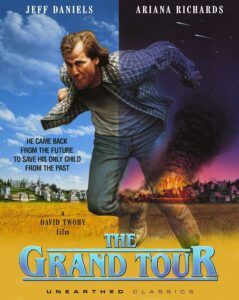 More Catalog Faves
More Catalog Faves
THE GRAND TOUR: DISASTER IN TIME Blu-Ray (98 mins., 1992, PG-13; Unearthed): David Twohy has been involved in a handful of memorable sci-fi/fantasy films, from the likes of “Warlock” and “Pitch Black” to the terrific, underrated Charlie Sheen thriller “The Arrival” and his later action-adventure flick “Terminal Velocity.” After beginning his career as a screenwriter, Twohy’s directorial debut came with this independently-produced, overly ambitious time travel drama which is awash in good intentions but tries to do too much from a story angle.
Coming off his lead role in “Arachnophobia,” Jeff Daniels plays an innkeeper haunted by the death of his wife and raising teen daughter Ariana Richards (pre-”Jurassic Park”). His latest guests are an odd assortment of time travelers who’ve tripped back in time in order to watch a disaster play out as it happens – one which threatens Daniels, his daughter, and all of their fellow small-town Ohio residents.
Twohy adapted C.L. Moore’s novella “Vintage Season” for this uneven film which carries an intriguing premise but struggles to strike a successful balance between its supporting elements. The time travel component shares time with Daniels’ melancholy sense of loss for his wife and struggle to raise his daughter in spite of his father-in-law’s attempts to wrestle her custody away from him – meanwhile, the time travelers themselves are such a strange bunch you never know how seriously you’re supposed to take the casts’ (very) broad performances. Twohy stages a central disaster movie sequence at the film’s center then throws in a pair of Jeff Daniels running around at the end – it’s all too much, making you think Twohy a few years later, as a more seasoned filmmaker, would’ve had a better handle on the material at that time.
Unearthed’s Blu-Ray debuts “The Grand Tour” – originally known as “Timescape” – on Blu-Ray (1.85, 2.0 PCM stereo) this month. The movie essentially went straight to Showtime as memory serves, bypassing a theatrical run, and while the disc claims to feature a new 4K scan, this appears more like a serviceable, older looking HD master. Extras include the “Timescape” opening credits, an interview with an editor about the “lost” Cannes promo reel (and it is lost – it’s not here!), production stills, artwork galleries, and the trailer.
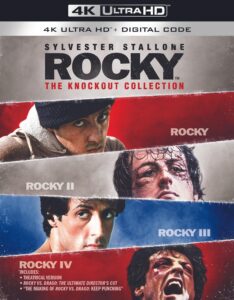 Issued to coincide with release of “Creed III” (albeit minus the participation of Sylvester Stallone beyond a token producer credit), MGM’s new ROCKY: THE KNOCKOUT COLLECTION on 4K UHD offers newly remastered transfers of the original “Rocky,” plus “Rocky” II, III, and IV – the latter in its familiar theatrical cut plus its all-new Stallone-supervised Director’s Edition dubbed “Rocky Vs. Drago.” Alas, this cut is something of a mixed bag as is the set as a whole, due to some disappointing audio tracks.
Issued to coincide with release of “Creed III” (albeit minus the participation of Sylvester Stallone beyond a token producer credit), MGM’s new ROCKY: THE KNOCKOUT COLLECTION on 4K UHD offers newly remastered transfers of the original “Rocky,” plus “Rocky” II, III, and IV – the latter in its familiar theatrical cut plus its all-new Stallone-supervised Director’s Edition dubbed “Rocky Vs. Drago.” Alas, this cut is something of a mixed bag as is the set as a whole, due to some disappointing audio tracks.
Since I’ve previously covered all of these films at one time or another (and most viewers are, by and large, more than familiar with them), here’s a quick synopsis of what you’ll find in this set:
The first ROCKY (119 mins., 1976, PG) is still the undisputed big draw here, debuting a fresh 4K-mastered transfer of the Best Picture Oscar winner. This 4K presentation (1.85) was first seen in a 2014 Blu-Ray that, itself, was a substantially more detailed and satisfying presentation than an earlier, MPEG-2 encoded Blu-Ray issued early in the format. Here, the 4K transfer on UHD, graced with HDR10, looks pleasingly “filmic” and impressive. The bad news is the audio mix is the 5.1 remaster from the last Blu-Ray, which omits some brief music passages and effects at times, while the advertised “original theatrical” mono is a stereo fold-down of the remix.
ROCKY II (119 mins., 1979, PG) continued the story of Stallone’s Italian Stallion in a somewhat long-winded but generally satisfying sequel (the first half of which takes forever to get through). Again, the 4K transfer with HDR10 (1.85) is quite excellent yet the audio is at a different pitch than it ought to be, affecting the 5.1 audio as well as the “original theatrical” track.
ROCKY III (99 mins., 1982, PG) was another massive smash for Stallone at the box-office, though its shortened running time emphasized montages and boxing action over character (a problem “Rocky IV” would magnify further). This fan-favorite outing is thankfully unblemished by audio problems in terms of its 5.1 mix while the HDR10 UHD transfer (1.85) is dynamite.
ROCKY IV (91 mins., 1985, PG) found Rocky battling Dolph Lundgren’s Ivan Drago in a 91-minute movie that looks, sounds, and plays like an extended music video from the heyday of MTV. The montages are pulse-pounding and it helps that the soundtrack is filled with memorable tunes, but dramatically, “Rocky IV” is the most superficial of the entire series, in spite of its box-office success. The HDR10 transfer (1.85 though some fans claim there’s a “1.78 misframed scene” a few minutes into the movie) is again superb and the 5.1 track is just fine, the mix doing justice to the lone series score not written by Bill Conti, as Stallone had tapped Vince DiCola, fresh off “Transformers: The Movie,” to write a more electronic – yet no less tuneful – underscore.
Stallone attempted to address some of the fourth movie’s issues by recutting the picture last year as “Rocky Vs. Drago,” that version debuting on streaming and premiering here in its first home video release. There are some nice added character bits yet a few humorous asides have been trimmed – and what’s worse, Stallone cropped the entire movie to 2.35, with the cinematography feeling uncomfortably (and understandably) cramped as a result.
Warner and MGM’s UHD box-set also includes Digital HD copies plus a bonus disc featuring some – though not all – of “Rocky”’s previous bonus features (notably absent is the feature-length doc on the making of the first film!). Overall, due to the absence of “Rocky V” and “Rocky Balboa” – and considering the audio problems on the first two movies – I’m not sure I’d recommend fans take the plunge on this release just yet…at least not until Warner Home Video announces any potential repressing/recall (as they did a few years ago on the “Mad Max Collection” UHD release).













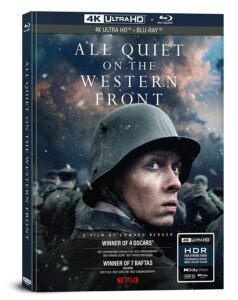 ALL QUIET ON THE WESTERN FRONT 4K UHD/Blu-Ray (147 mins., 2022, R; Capelight/MPI):
ALL QUIET ON THE WESTERN FRONT 4K UHD/Blu-Ray (147 mins., 2022, R; Capelight/MPI):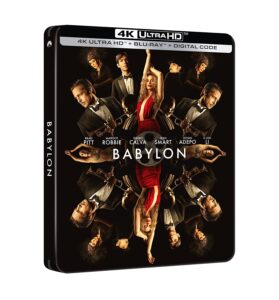 Also New & Noteworthy
Also New & Noteworthy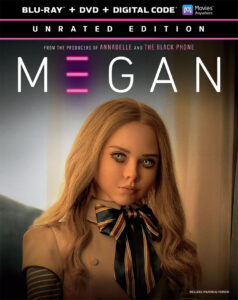 M3GAN Blu-Ray/DVD (102 mins., 2023, PG-13/Unrated; Universal):
M3GAN Blu-Ray/DVD (102 mins., 2023, PG-13/Unrated; Universal):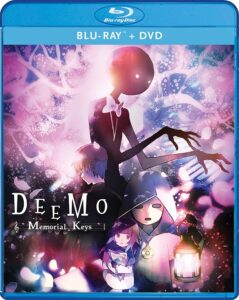 THE WHALE Blu-Ray (117 mins., 2022, R; Lionsgate):
THE WHALE Blu-Ray (117 mins., 2022, R; Lionsgate):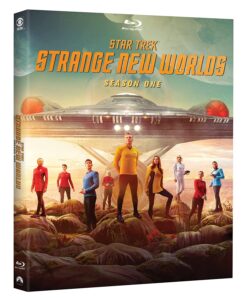 Series on Disc
Series on Disc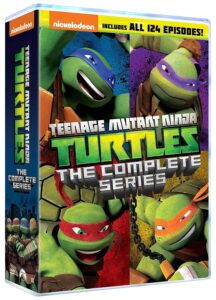 TEENAGE MUTANT NINJA TURTLES – The Complete Series DVD (2819 mins., 2012-17; Paramount):
TEENAGE MUTANT NINJA TURTLES – The Complete Series DVD (2819 mins., 2012-17; Paramount):
